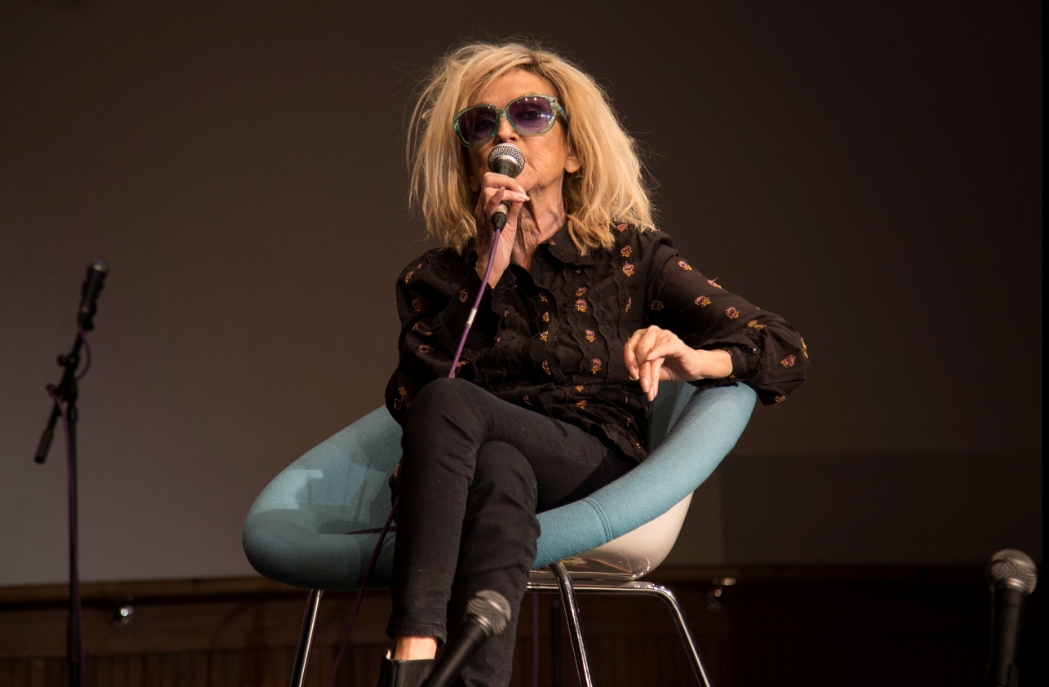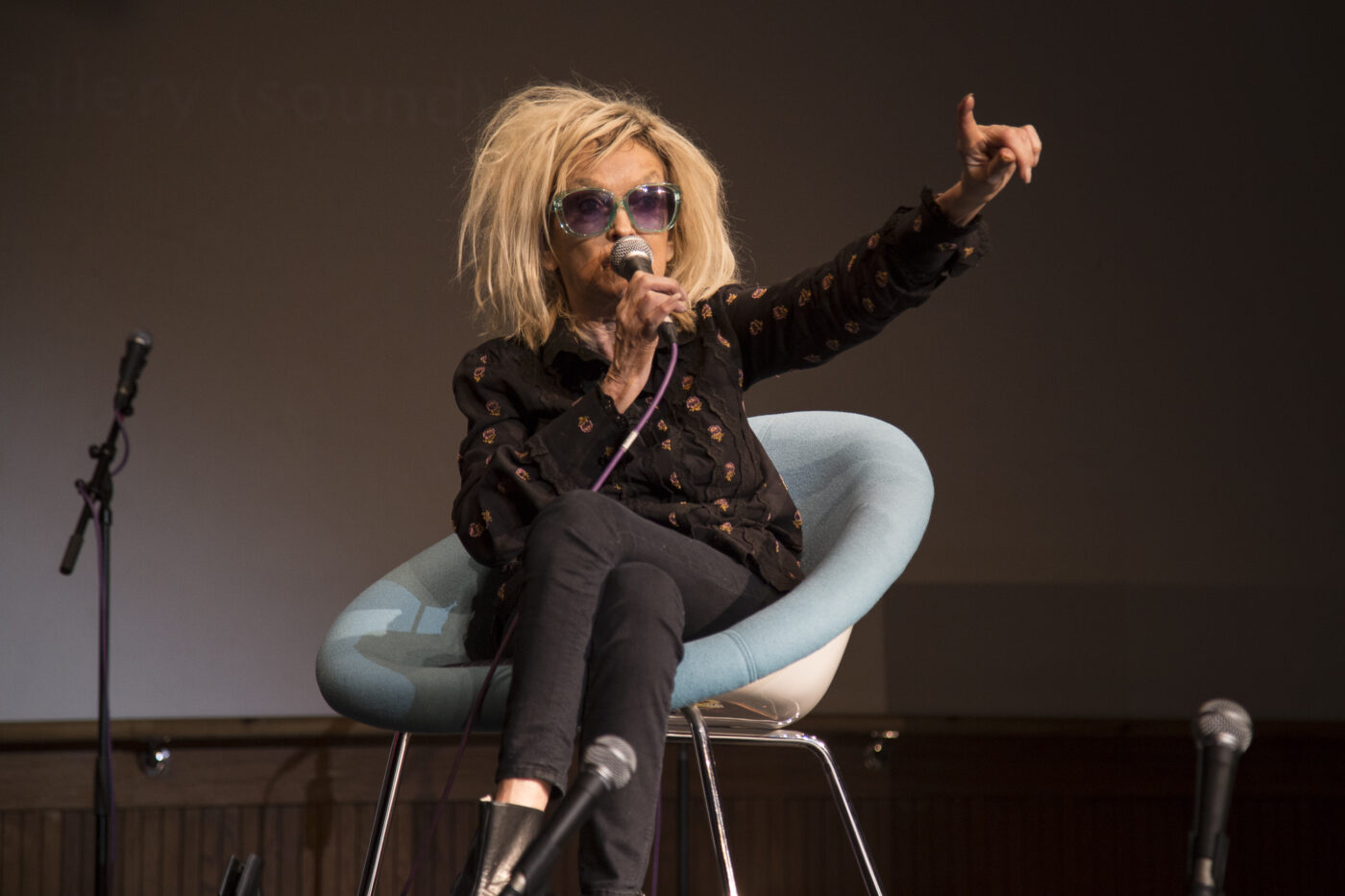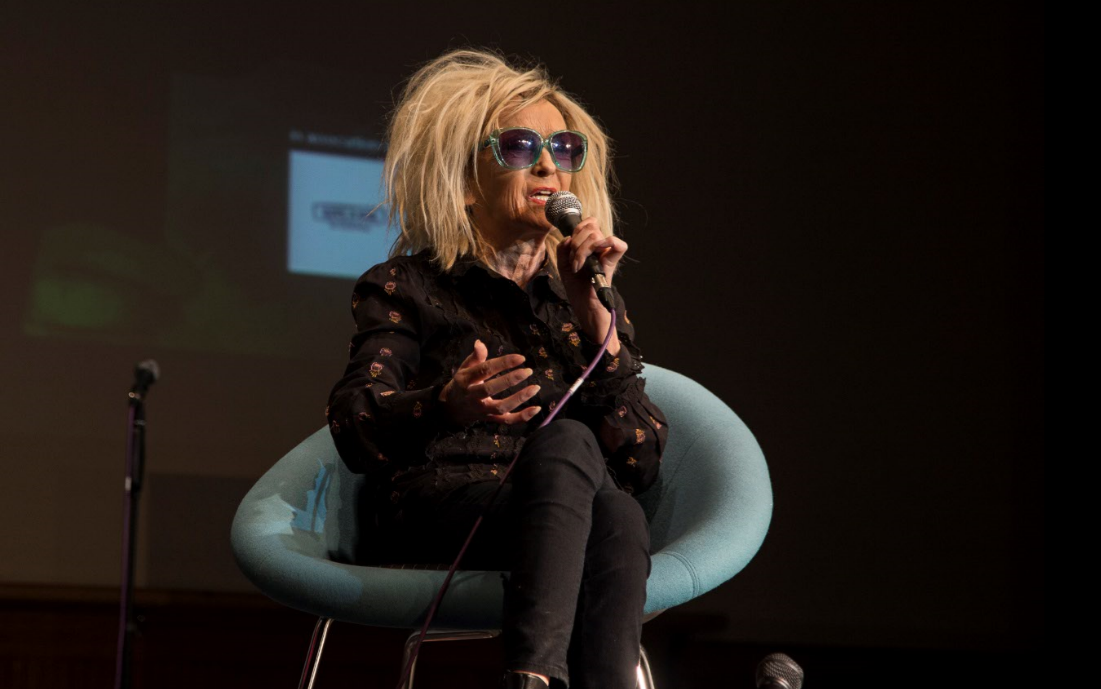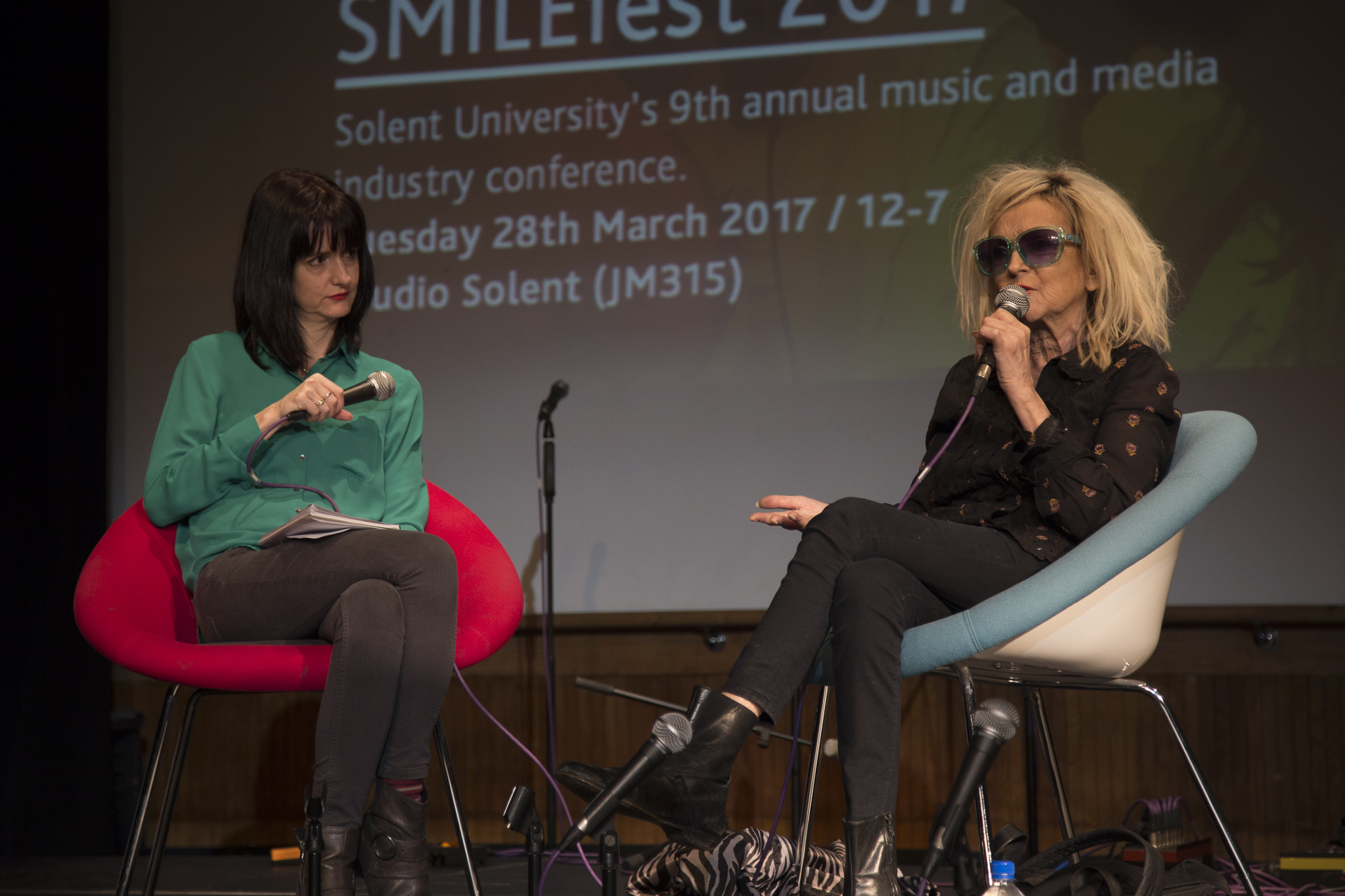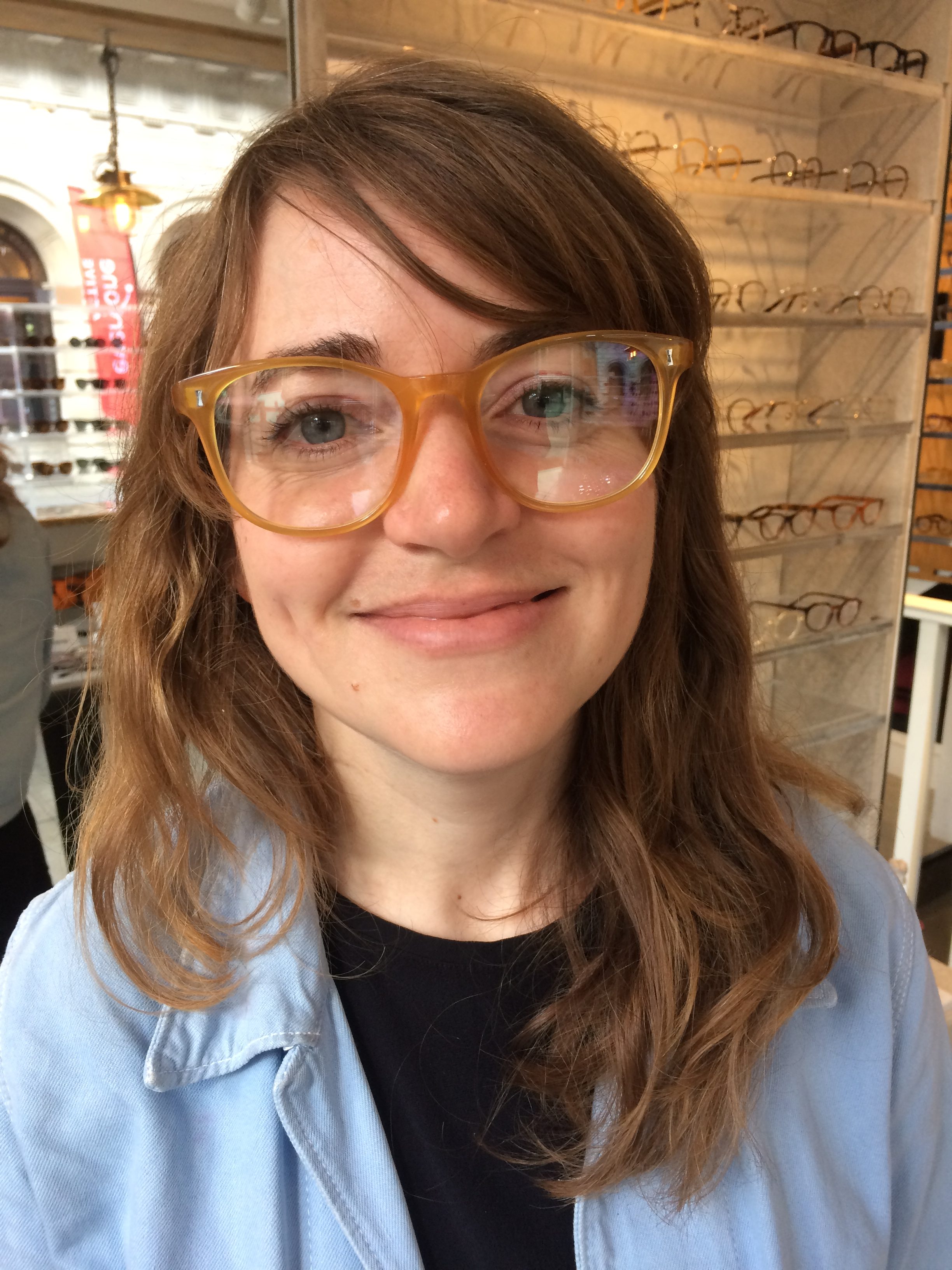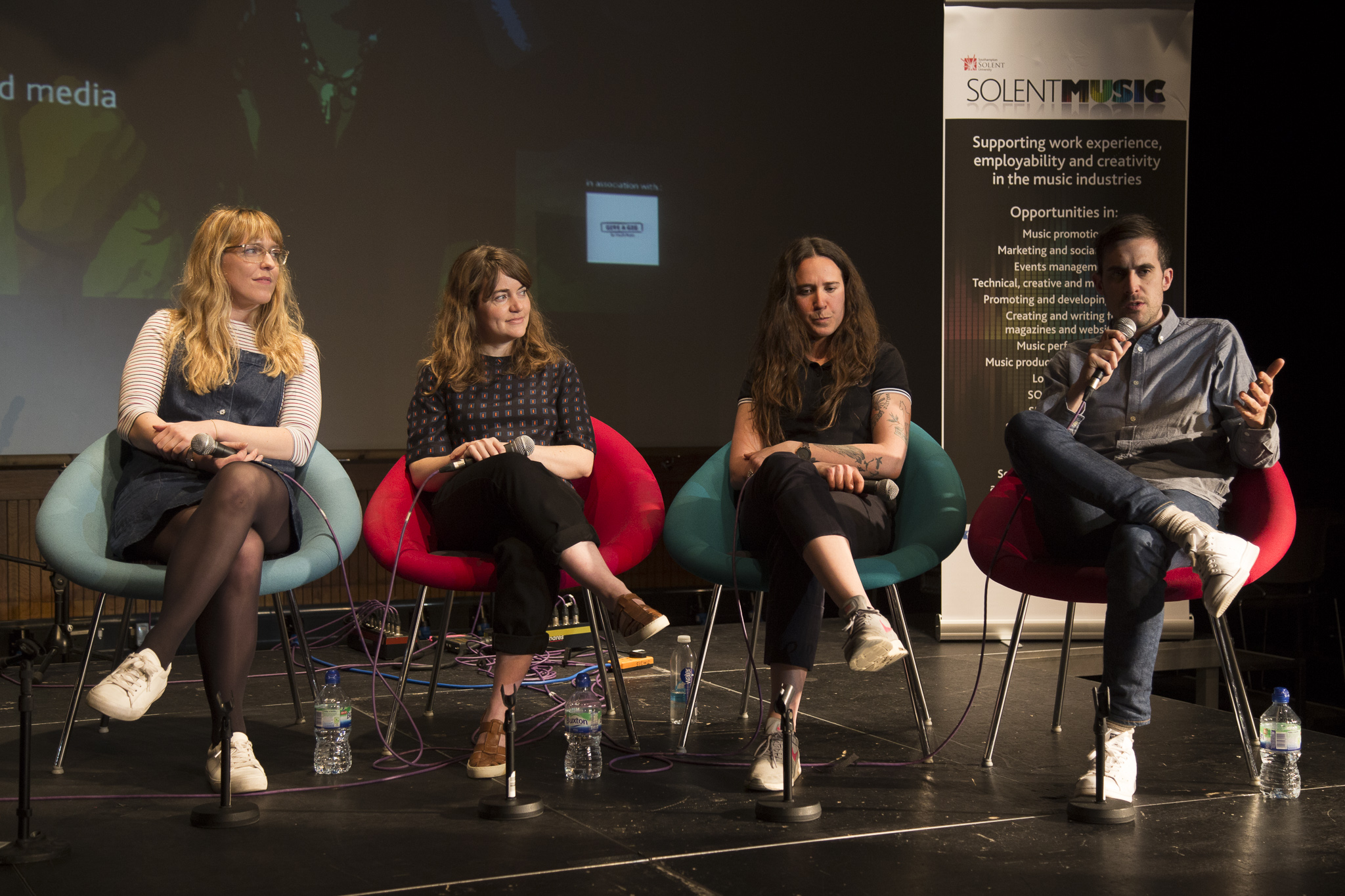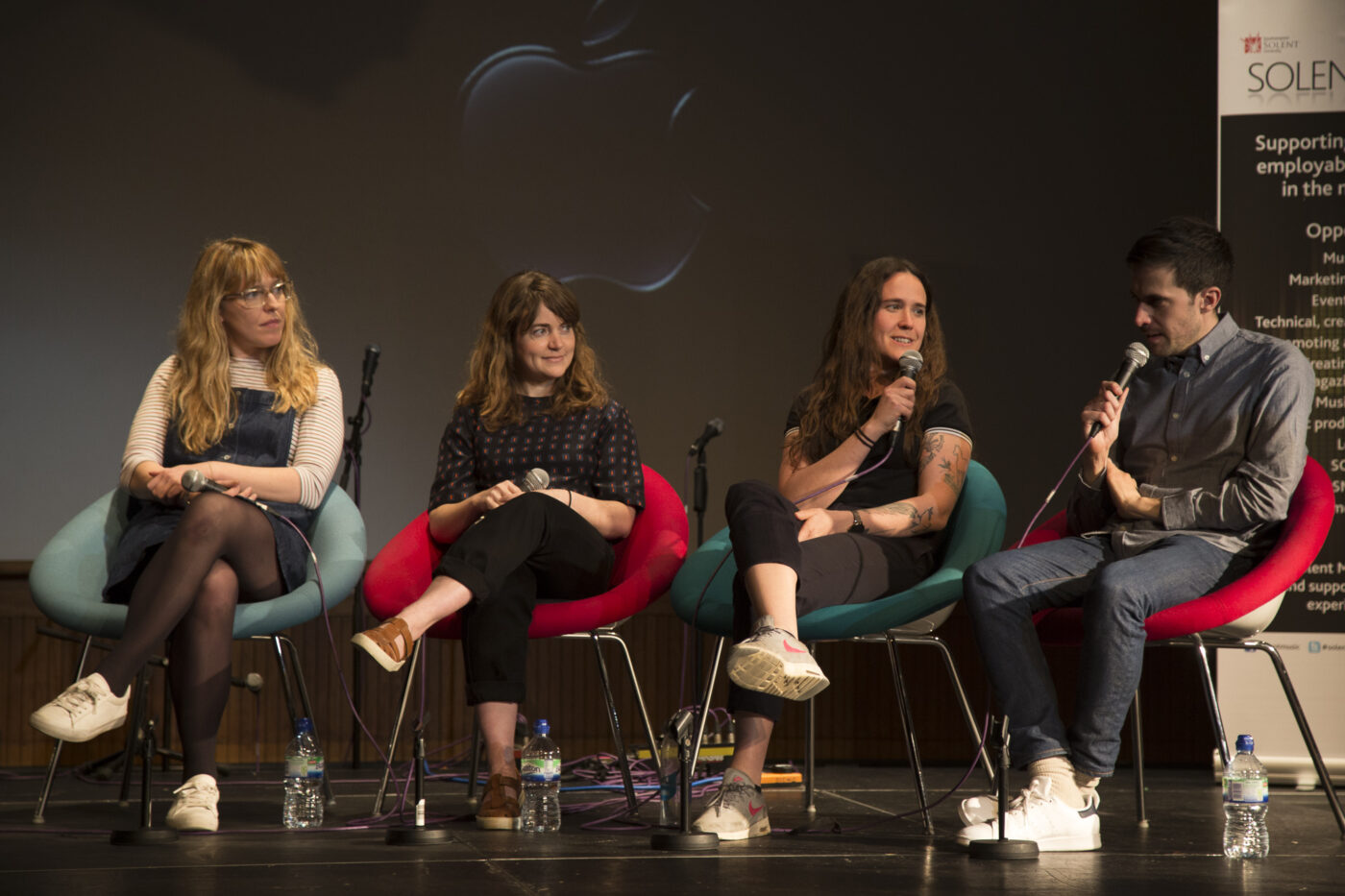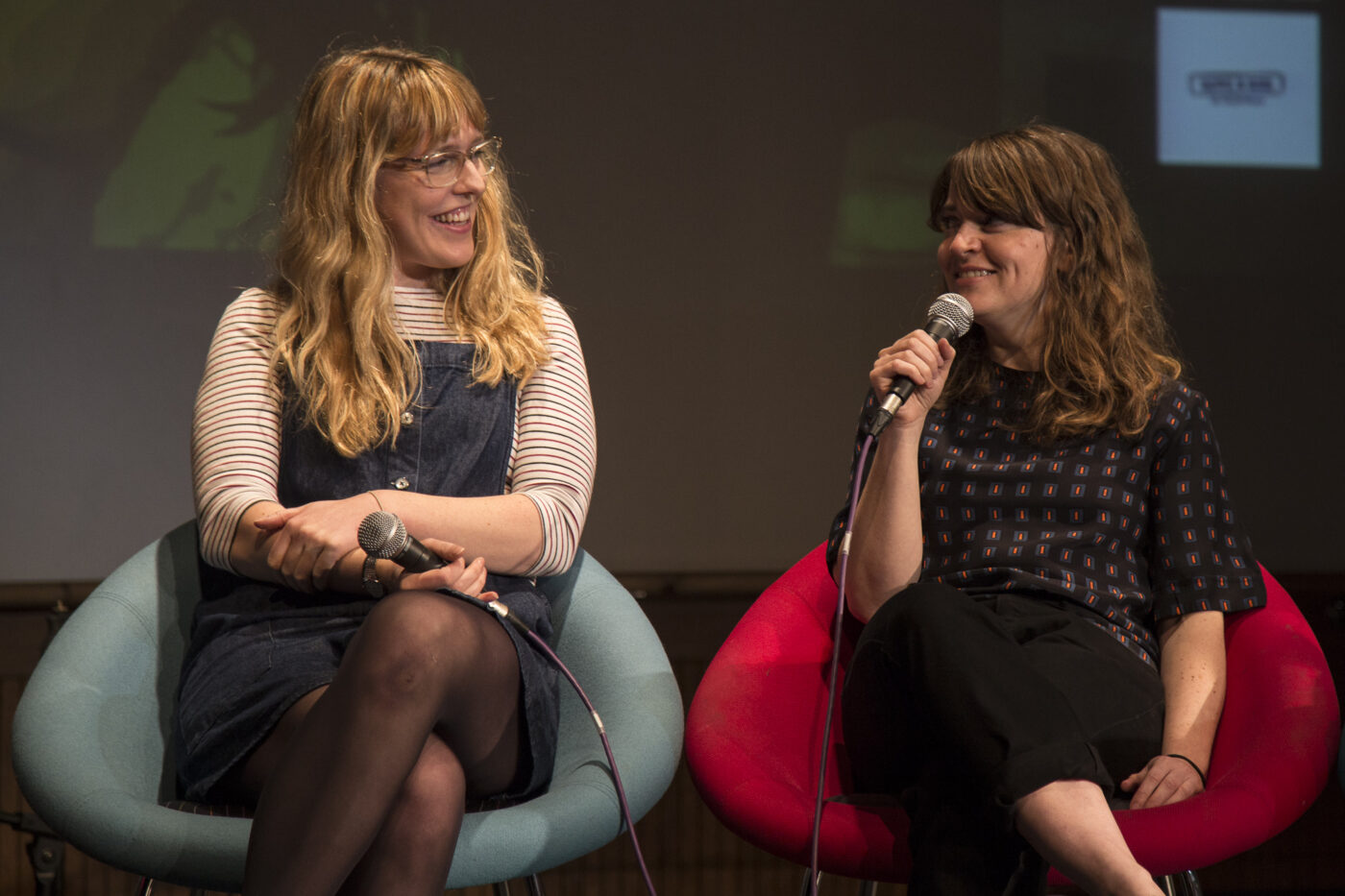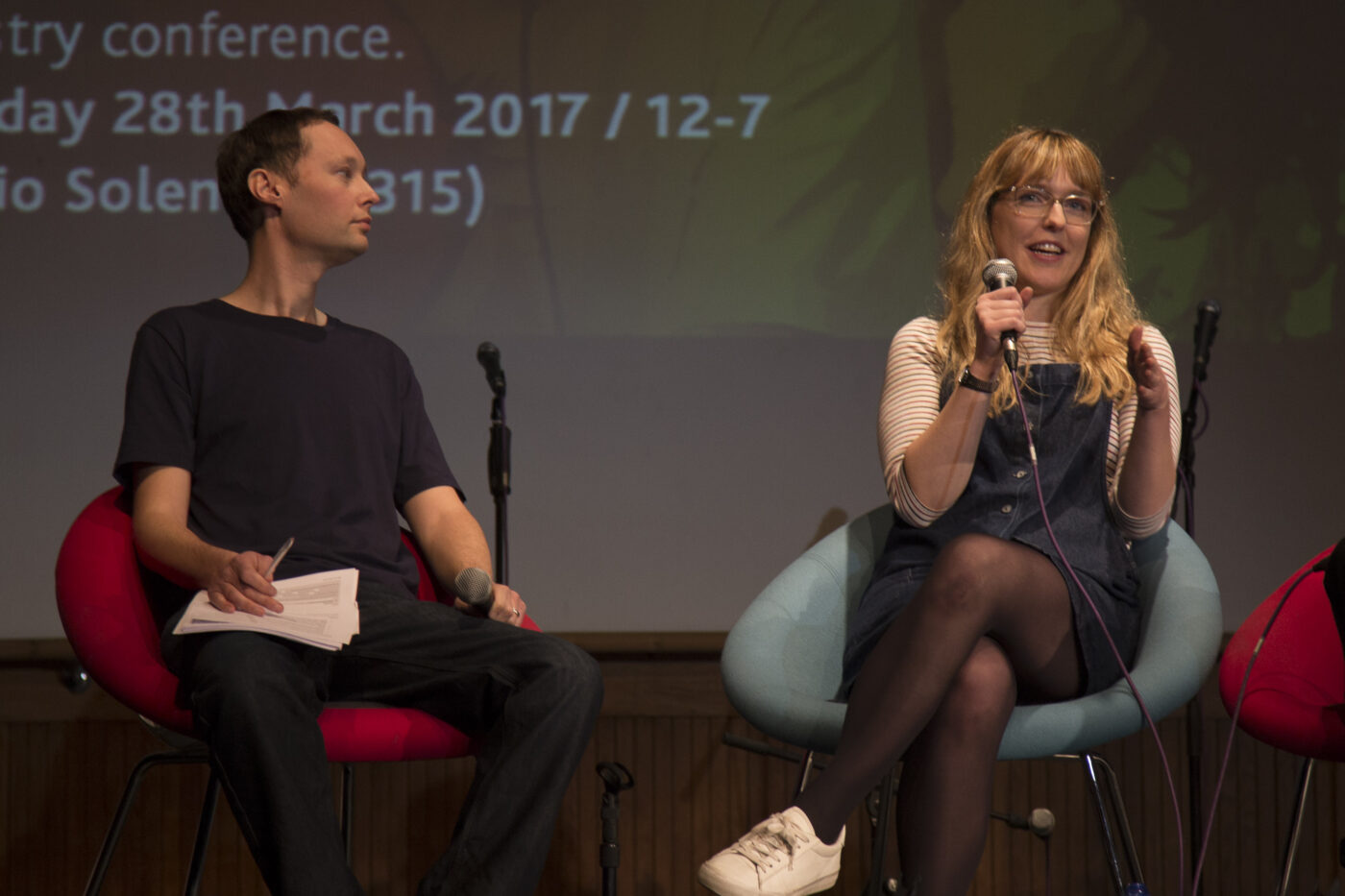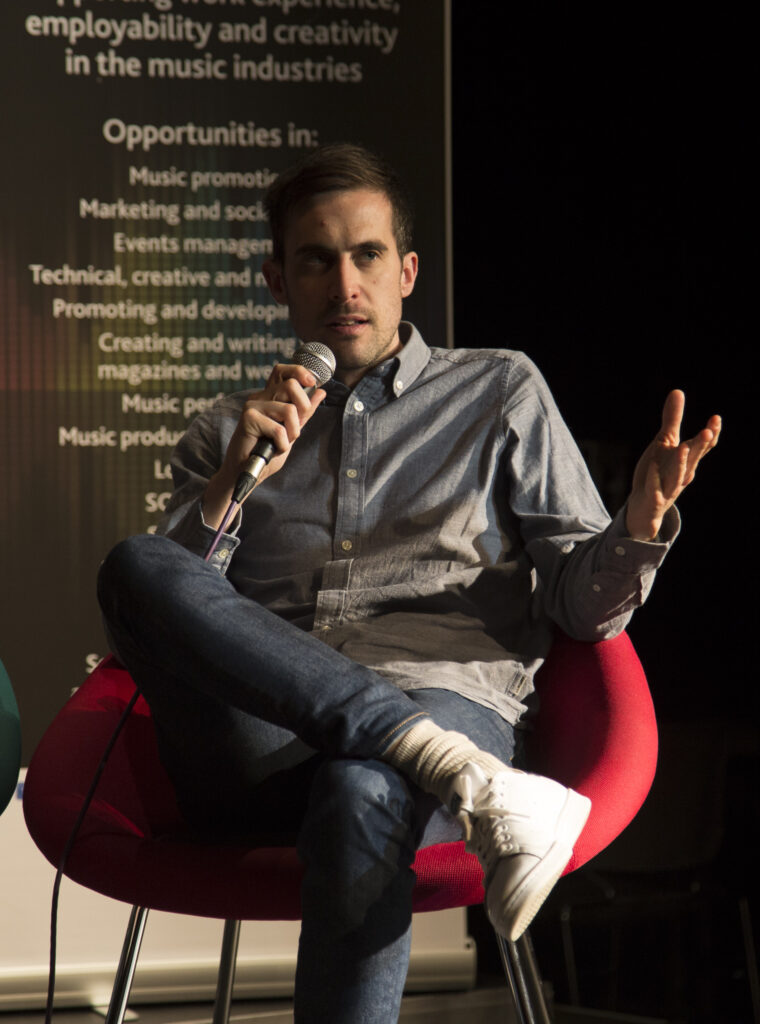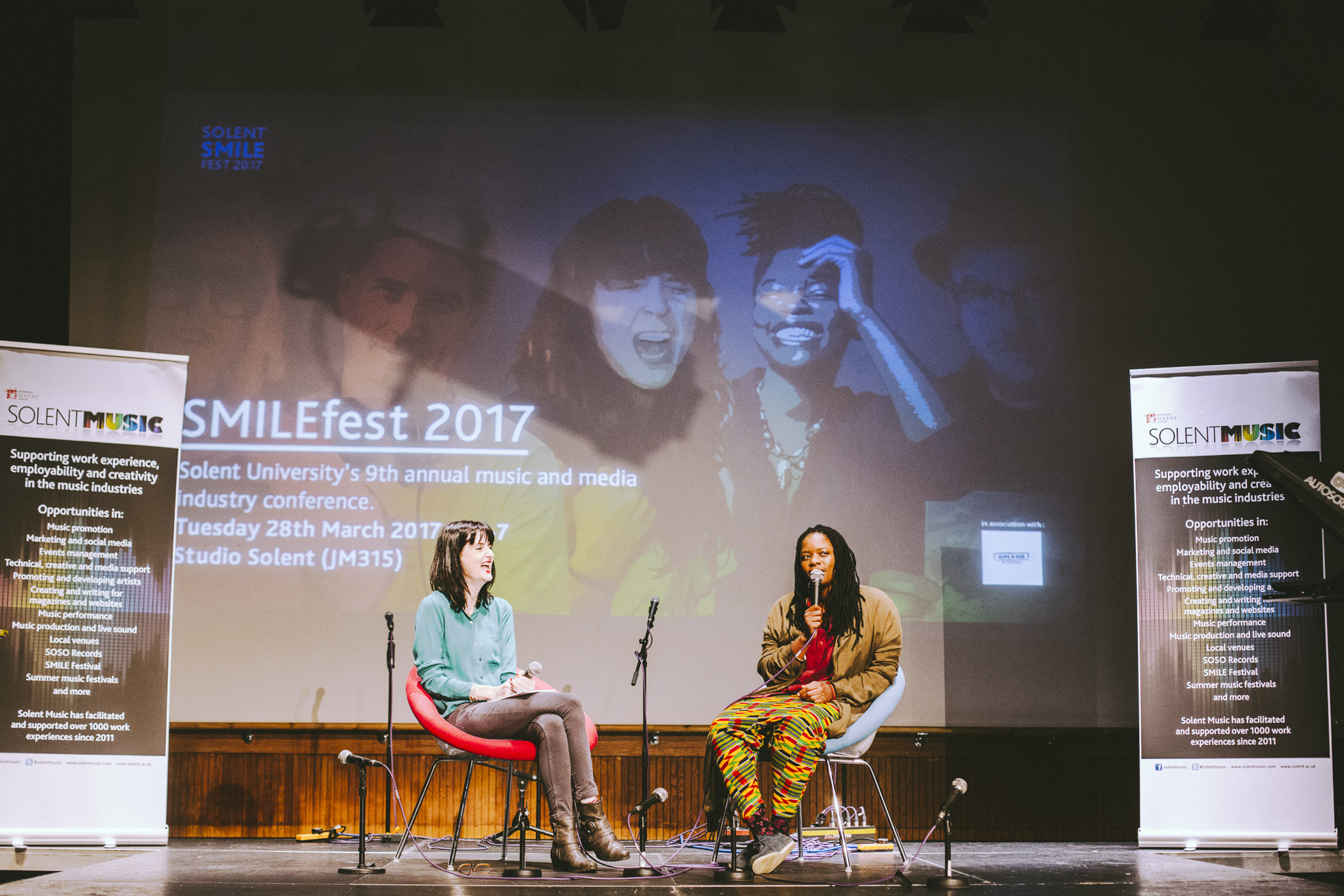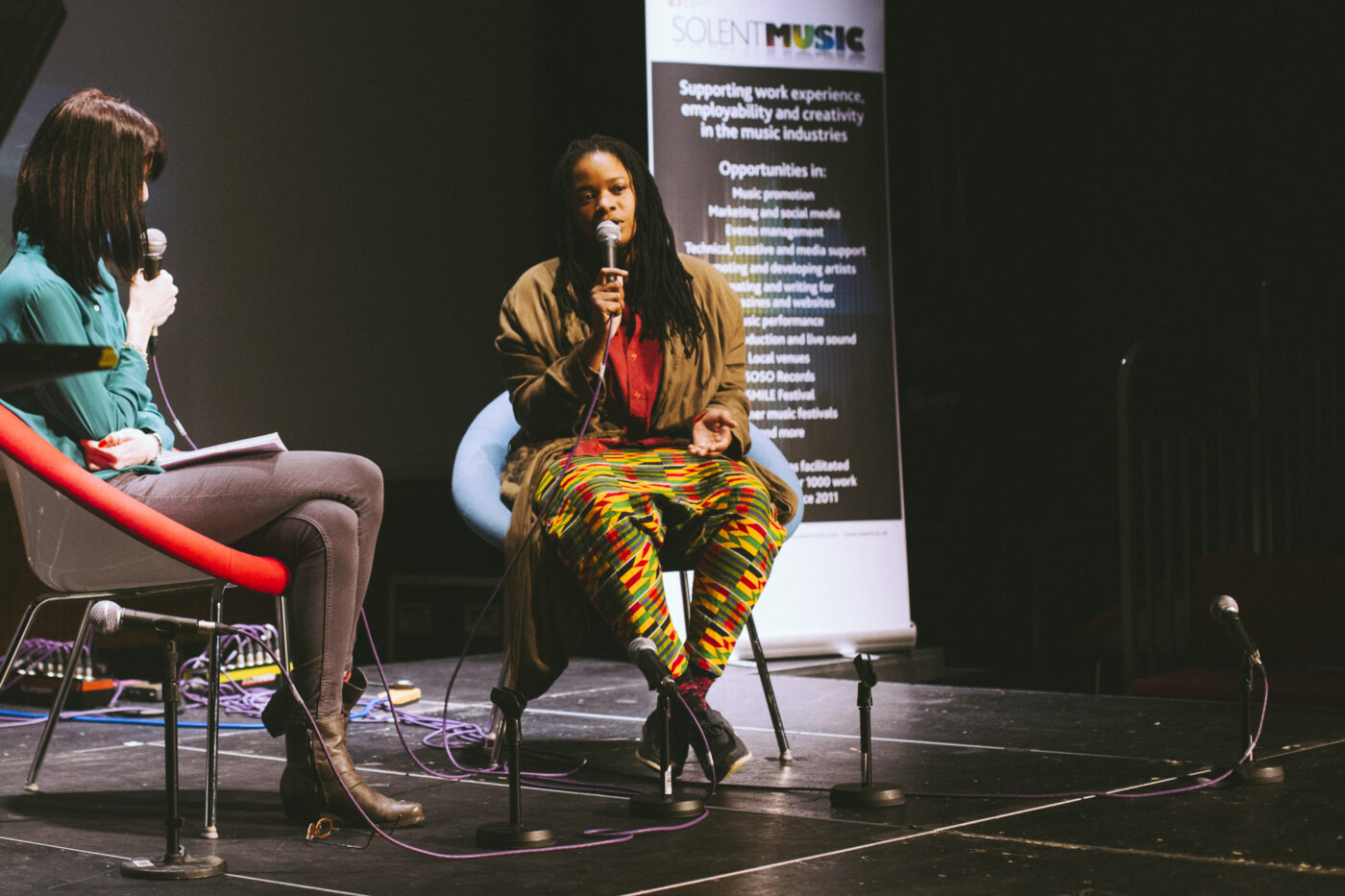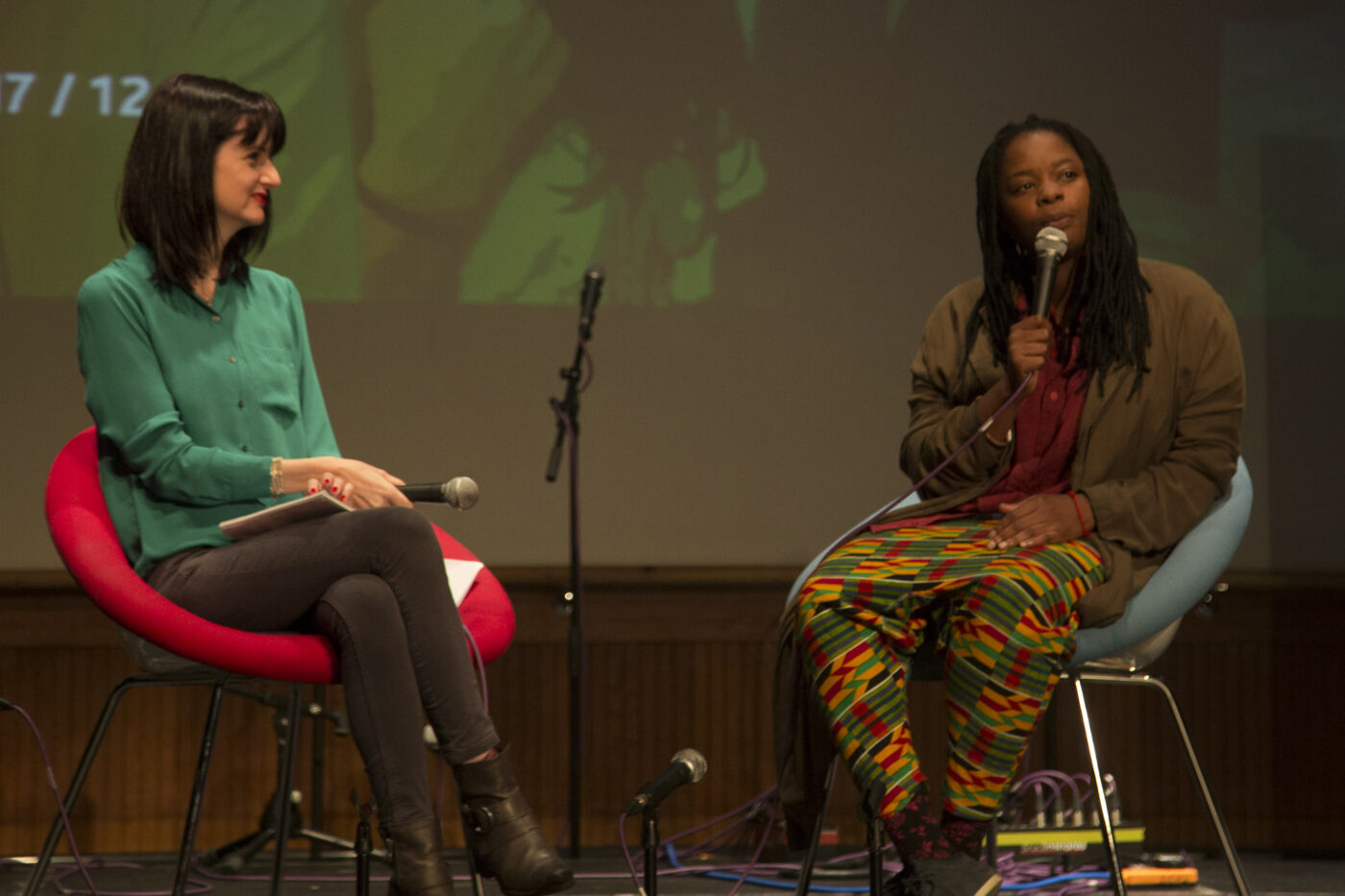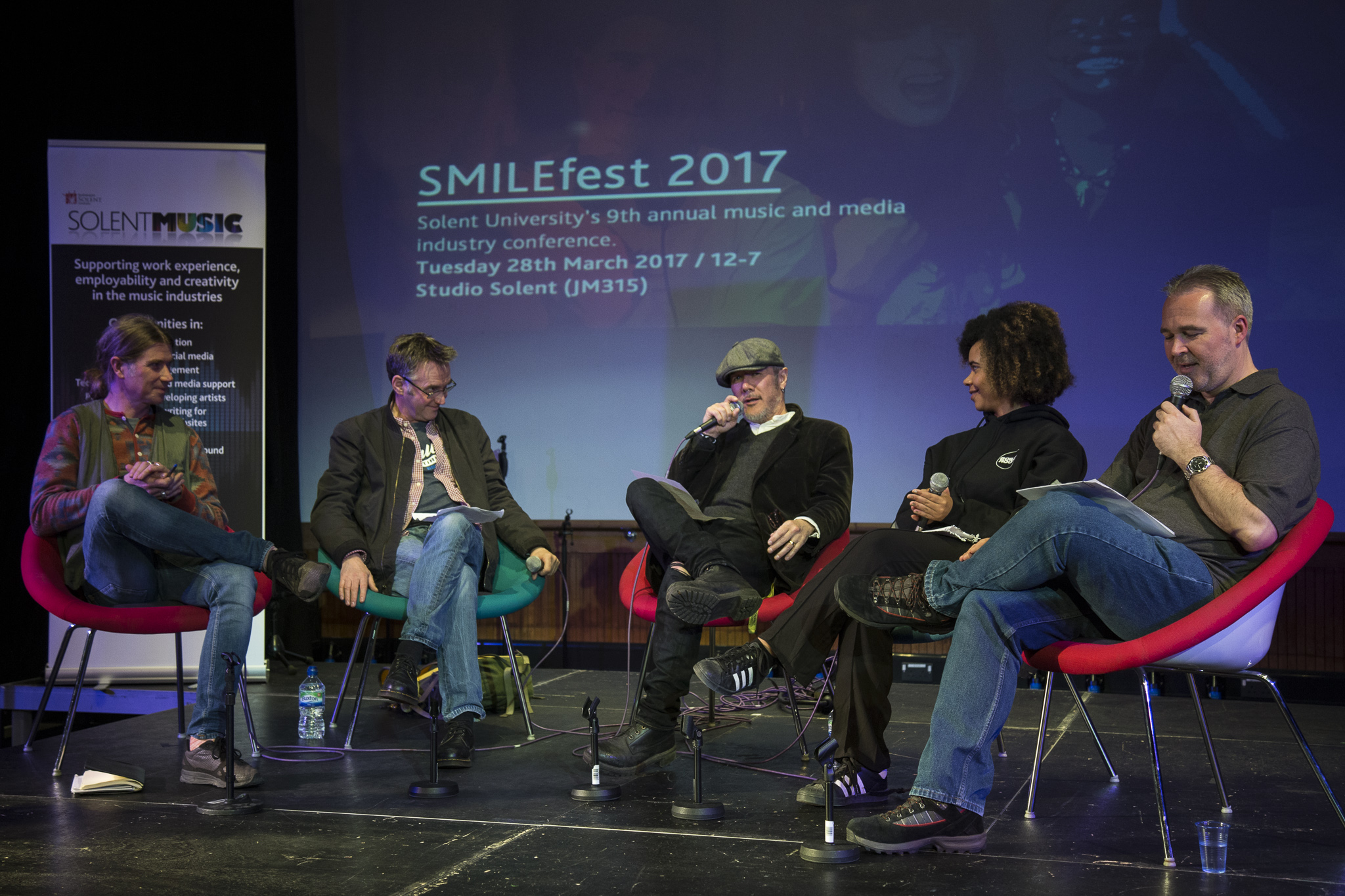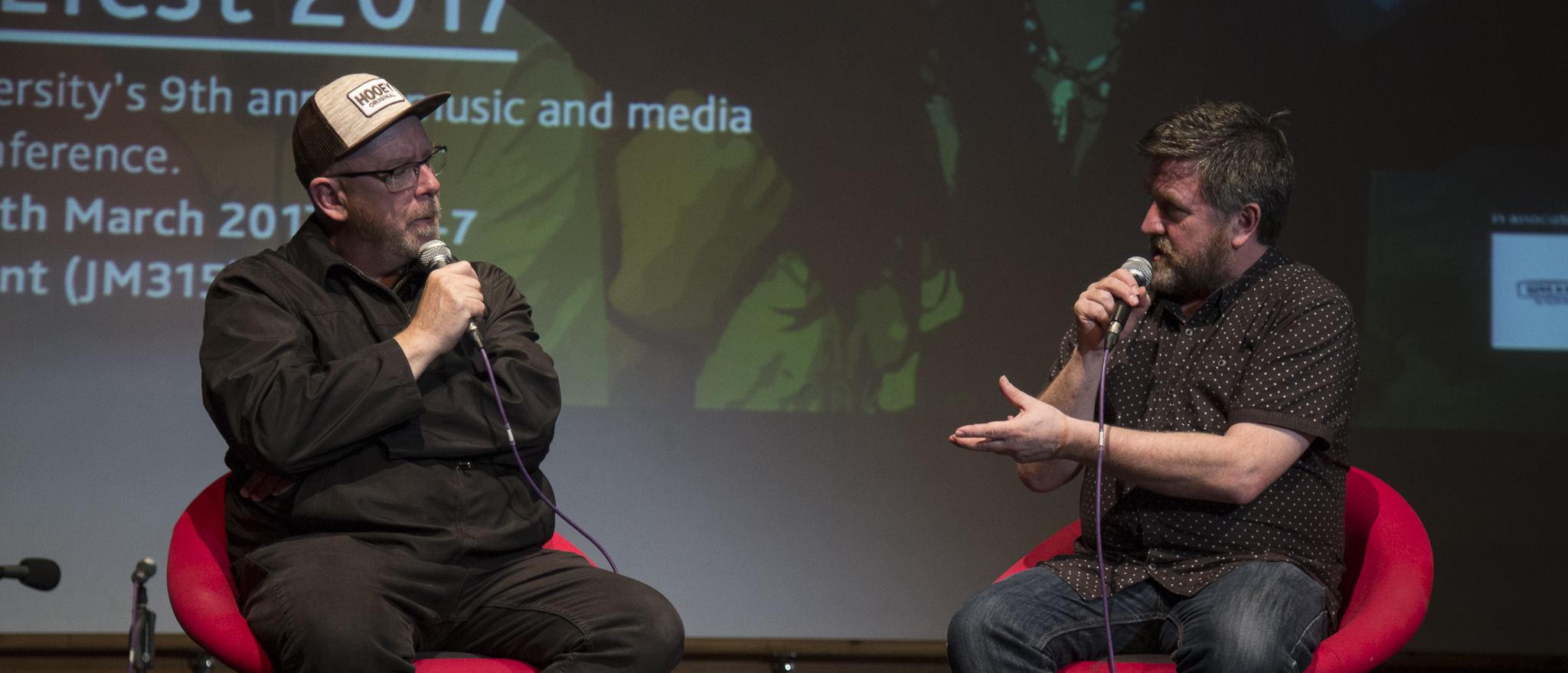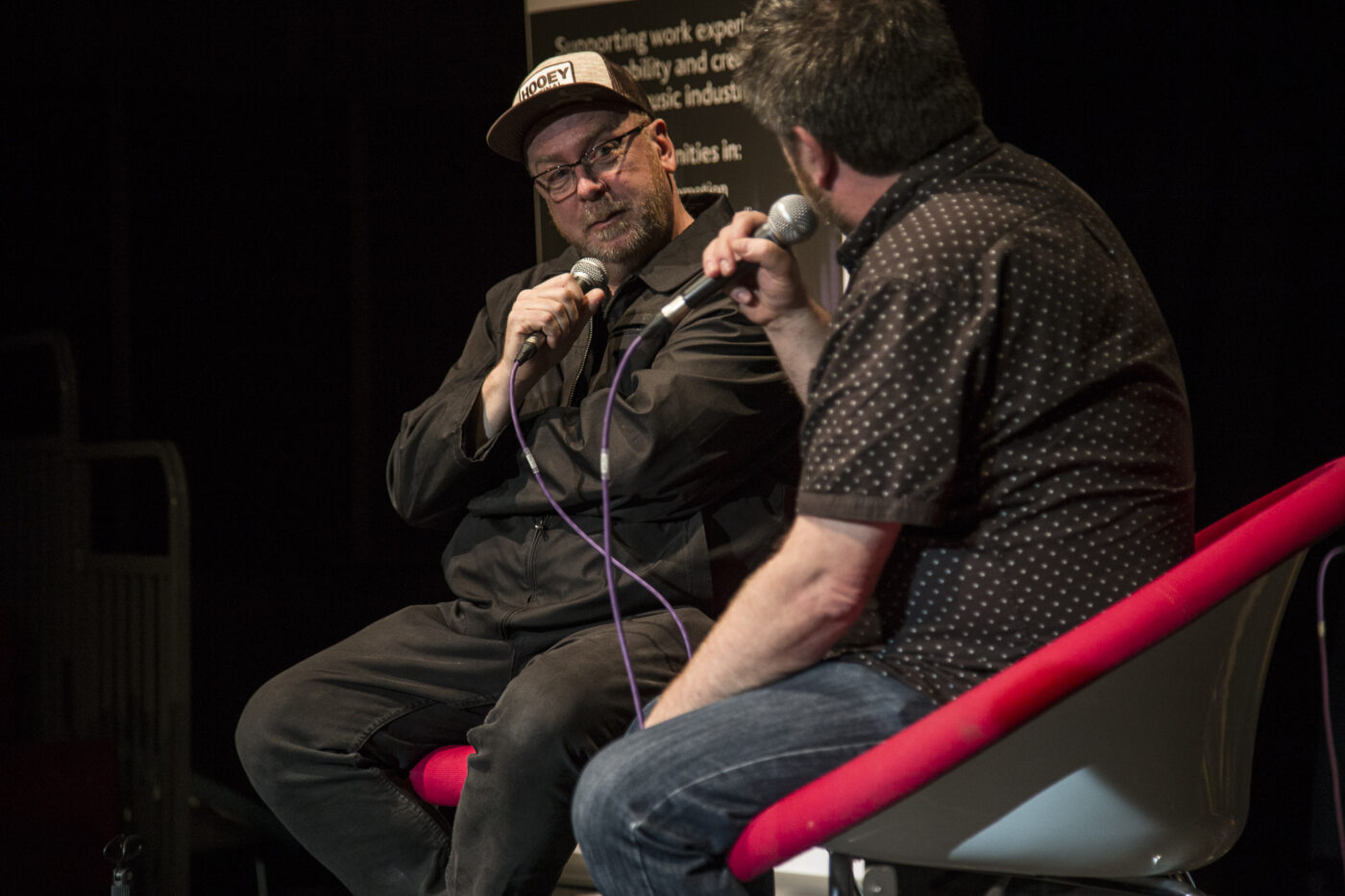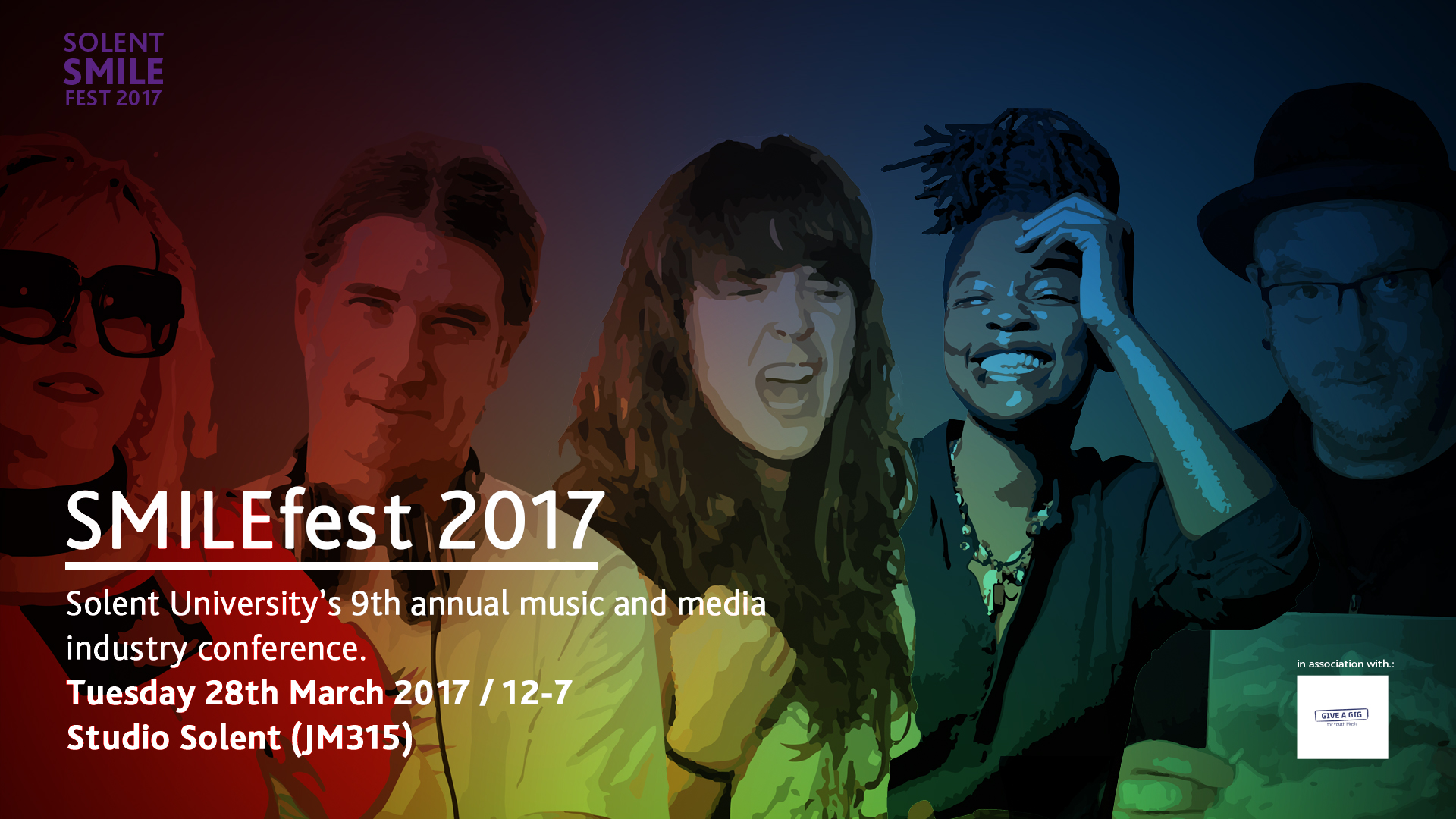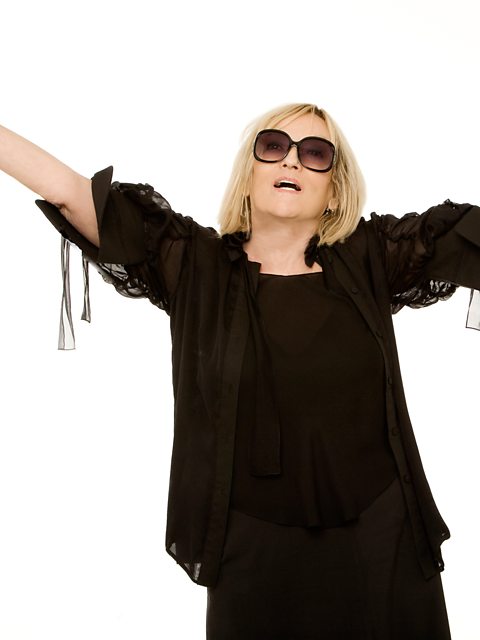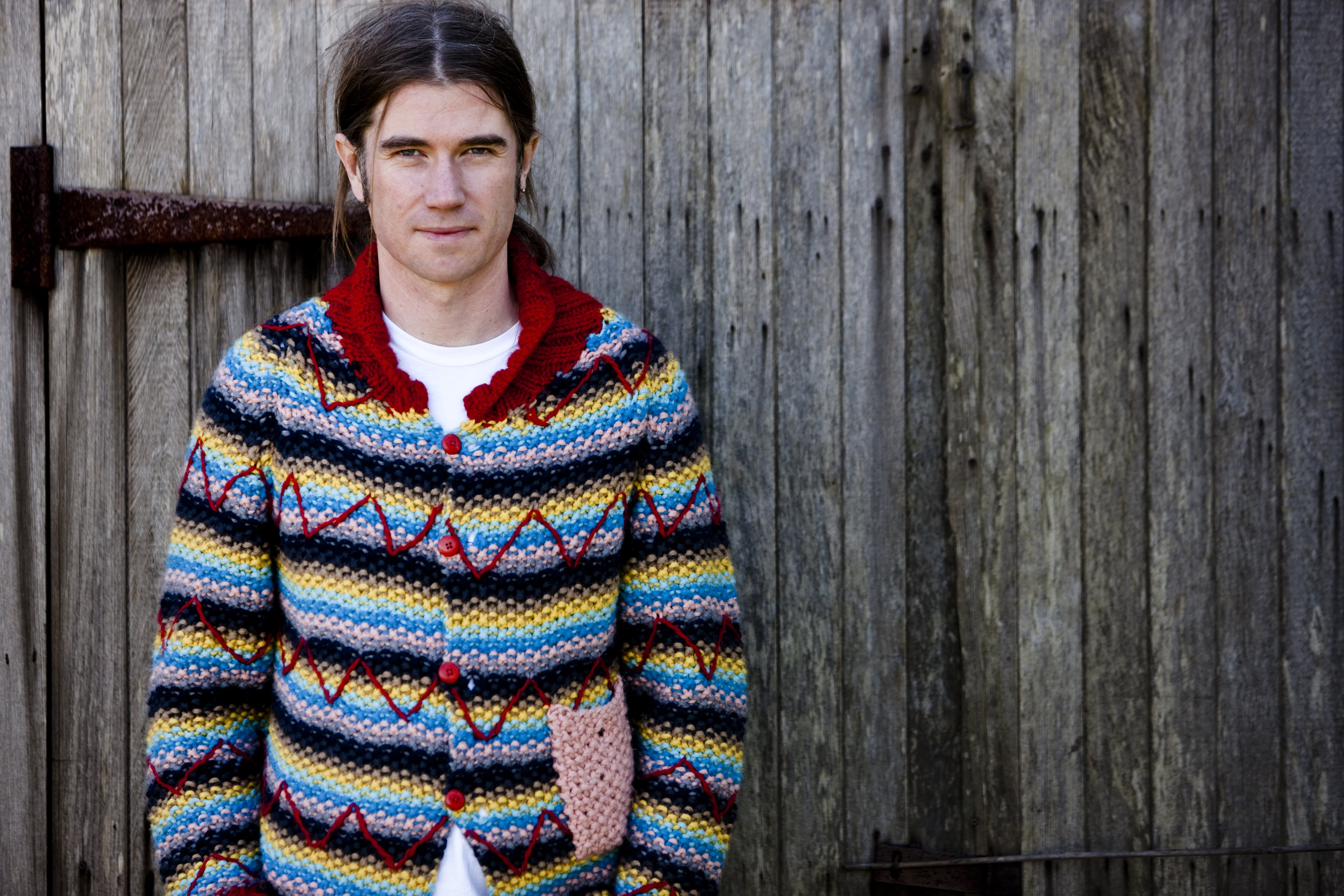Solent Music’s Demo Surgery 2017 highlighted some of the best music created by Southampton Solent University’s music students.
The Demo Surgery was hosted by Dr Chris Anderton, the director of Solent Music and course leader for BA (Hons) Music Promotion and BA (Hons) Music Management, and the panel featured the following music industry guests:
Rob da Bank (Bestival, Camp Bestival)
Alan Pell (former director of A&R at EMI, music industry consultant)
Olivier Behzadi (former director of A&R at Columbia/Sony, Sassy Films)
Amanda Maxwell (Boiler Room, She Said So)
The panel started off by dissecting the meaning of A&R. A&R people are often perceived as the gatekeepers in labels and according to the panellists the former have got to play nice with everyone because you never know what who’s going to become. That mentality, however, can give artists wrong impressions, so it’s important to keep a clear head.
Photos by Rosalyn Amy Boder
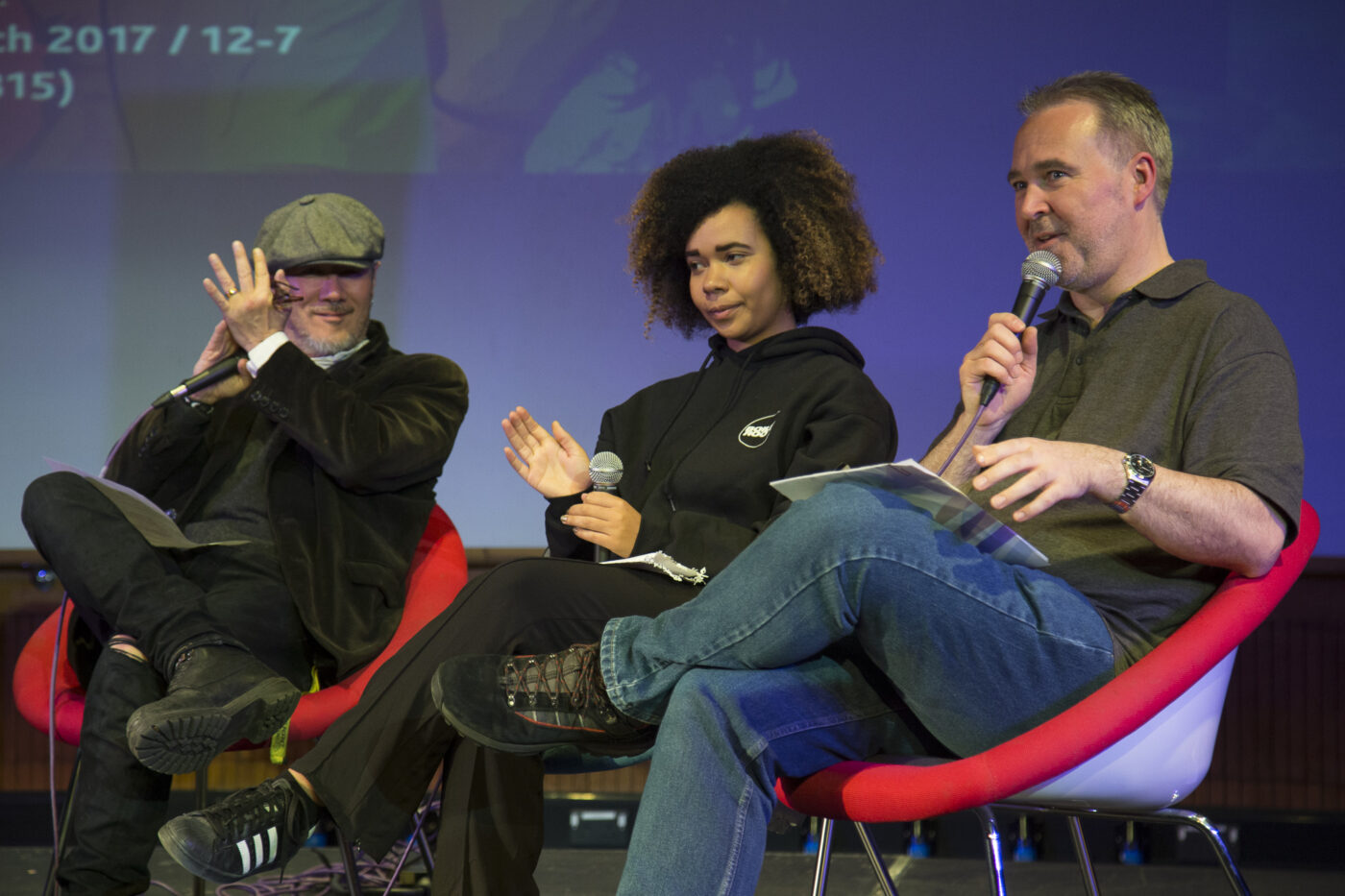
Amanda, ’A&R is also going to be that backbone and someone you can rely on throughout your career.’
Here’s the feedback for the tracks that got played at the Demo Surgery panel. Those whose tracks couldn’t fit into the limited time frame, had the opportunity to chat to the panellists personally for feedback.
You can find the whole playlist of this year’s submissions on our SoundCloud account here.
Mbrace – WANS
Rob da Bank, ‘I spend all day listening to demos and I usually make up my decision within the first 20 seconds. I loved the beginning, it’s spacey and moody. The only thing I’d say is that you knew when the break was going to come in – you could expect it.
People like James Blake and Calvin Harris have got really good at doing unexpected things. Dropping every four bars is what everyone does, so you could definitely be more experimental and change the structure. But I loved the general vibe.’
Alan Pell, ‘Nice vibe, sounded great. It would be great to listen to in a club really loudly. It ticks all the right boxes and DJs could mix it really easily. But you should also think about the end game. Where do you want to take it? If it’s a record deal, I would suggest doing something more different like Rob said. But again, it’s fantastic to get some DJ mixes and remixes done.’
Olivier Behzadi, ‘You have to be cautious in dance music. Production-wise it sounded very interesting but but became generic. I agree with everyone else, drop things in where you don’t think they should go and push the envelope a little bit. Look for your own feel.’
Amanda Maxwell, ‘I was mind-blown, I could never make something like that. Amazing, well done! I do see the moment where it can be generic but if you can experiment a bit further, establish what you want to do, and if you work out your sound, you’ve definitely got the making of being a good producer.’
Mbrace SoundCloud
Miles Hobbs – Green People
Alan, ‘Really liked this, it was pretty cool. I loved the biog: ’I’m a songwriting bassist from Essex with a Lego addiction..’ – It’s really quirky and original. If you heard that, you would know that it’s Miles Hobbs, it stuck out. Would the whole album work? I don’t know, but I’d like to hear some other stuff. It’s one of those where it depend on what the other material is like. Like The Kinks – they had quirky songs and some rock. Also, They Might Be Giants had some great stuff, like the song on Malcolm in the Middle.’
Olivier, ‘I also liked it. The only wisdom I can offer is that the vocal levels are a wee bit low and you might want to compress the acoustic guitar. But it’s nice and quirky, you can hear The Kinks in there. I really enjoyed it. This has so many hooks and earworms that it would be great for TV commercials – I might even consider it.‘
Amanda, ‘I wondered if it was part of an album. When I first heard it, I thought it would be great for an advert, too, a nice, bright, sunny one. Flora maybe? You can definitely consider different outlets for it.’
Rob, ‘I share the opinions. It’s very ’60s, like a high-sugar-orange-drink-for-kids advert.’
Miles Hobbs Facebook
Vita Jazz – Into Your Dreams
Amanda, ‘I really liked it. I would rather have more bass. I could also see somebody like Paloma Faith or Pixie Lott playing around with it, being sultry and sexy. I’d just like a little bit more ‘oomph’.’
Rob, ‘I love ’90s trip hop and that loop was like that, the oriental flavour. I think it needed a bit less of that brass part, the loop is great and the vocal is great. Less is more. Like post-electronic where it’s okay to have two sounds and the vocals. But yeah, the voice is great.’
Alan, ‘I thought it started off really well, but I was waiting for it to change into the chorus and go up but it didn’t, the loop kept going on. The flute bit and the vibe were great but I kept waiting for the chorus to kick in.’
Olivier, ‘The lick starts off like, ’Wtf is this, this is great!’ I really liked your vocals, but from the production perspective there’s a little bit too much reverb. The Chinese lick wears itself out and starts fighting with the vocals. In the chorus you need to drop it or change it up. I loved your vocal and the harmonies, really great.’
Vita Jazz Facebook
COSTIA – So Say It
Alan, ‘It goes back to the end game, what’s the end game? This is a rock band, they’re going to have to go out, gig and build up a following. The way rock bands build up following is to play fantastic gigs and it comes down to the songs. This jumped around too much and tried to be everything. You can get experimental once you’ve got your fans with you. Have a listen to The Breeders ‘Cannonball’.
Rob da Bank, ‘I actually really love the drops in it. It sounded a bit disconnected between the vocalist and the producer and the loud drum sound. But I really liked the chorus, it was a good point.’
Olivier, ‘It’s got some art rock elements in it, but for me there wasn’t enough vocal production.’
Amanda, ‘I think people would like it as change-y, I like that about it. I visualised where I’d be, and I could imagine being at a gig with people singing a long, but I did want the chorus to go a bit further.’
COSTIA Facebook
BASEMENT83 – Growing Pains
Rob, ‘You could see the toes were tapping and heads nodding. Electronic music is hard to make different because there’s so much of it out there, but I think it’s a good old-fashioned reggae sounding tune, vibrant and melodic. You could even see the camera man vibing to it.’
Amanda, ‘I loved it, it took me back to when I was 17 and driving around in my white Corsa. It’s waking up at a festival on a Sunday when you’re not feeling great and you have another pint and go on with another day at a festival. That’s what you want to hear when dancing in the sun. It had all the elements that made it come together.’
Alan, ‘I really loved it, fantastic. Coming back to the point of the end game? Why are you a band and what do you want to do. This is an area not many bands are around and there aren’t many great bands that can get a crowd up and jumping. I think you could do really well on this. My thumbs up.’
Olivier, ‘I really enjoyed it as well. For a while now there was a moment when reggae was a thing and it hasn’t been for a really long time, so it was nice to hear it. It sounded pretty authentic sonically, too, it didn’t feel compromised at all.’
BASEMENT83 Facebook
Jade Cocoon – Chemicals
Amanda, ‘I loved it, really loved it. It took me back to the ’90s and American pop videos where everyone dances around having fun. American Pie sort of vibe almost. Really catchy, I really enjoyed it. Well done!’
Alan, ‘I really liked it as well, it was really cool. I liked the South-African guitar bit and that it wasn’t just a simple pattern. Loved the lyrics, very clever and quirky. It was really good, loads of things I.’ liked
Olivier, ‘Me too. I got a bit of Everything Everything out of it. Interesting drum programming and the staccato was well-handled. It’s hard having it so syncopated from a drum and vocal perspective. Guitar was interlaced too. It was lacking a bit of bottom end in the mix, get a bass player in. Reminded me of Paul Simon’s ‘Graceland’ meets Vampire Weekend.’
Rob, ‘Phoenix as well and the ’90s Justice, French vibe. I love one-man bands that can do all of those sounds in the studio. I’d love to see it live. It sounds like something that could be on the radio, I thought I’d heard it before.’
Jade Cocoon Facebook
Evelina Karasjova – Paralised
Rob, ‘I love Sade and soul. The drums weren’t the best, but the bass sounded excellent. Vocals sound great, too, and it all comes together as a proper song.’
Olivier, ‘You want to get together with Mr Jade Cocoon to play drums for you. Just to compliment what you’re doing. As a first effort of writing, producing and performing, it’s really good.’
Amanda, ‘It took me back to listening to Sade. The drums had an ’80s feel but I’d like a bit more from them. Otherwise, it was great! Nice and smooth.’
Alan, ‘Personally, I’m less worried about the production, they are demos. It’s one of those songs where you’ve got a really good idea for a loop and build a song around it. I was waiting for the chorus to come in. Don’t be afraid to experiment.’
Evelina Karasjova SoundCloud
Dub Soldier – I AM THE HUNTER
Alan, ‘It started off great and the loop is great, but it didn’t go anywhere for me.’
Amanda, ‘I considered it in another light. It’s something I would have as a warm up act or maybe in an advert – a car advert. It’s important to not necessarily think about it as playing at clubs, but consider other good outlets too.’
Rob, ‘It’s quite cinematic, really ’90s and I love retro music. It’s a tiny bit repetitive but I totally agree, I could see it in an ad. I could also hear it booming in South France.’
Olivier, ‘For me, it started off as one thing and developed into something else. Started off feeling like a production and developed into a song. It didn’t have enough finesse and could be more polished, but it was certainly very interesting.’
¥eti – Please Be My Po’ Boy
Rob, ‘It stood out for me. It doesn’t sound like anything I’ve heard today. I listen to a lot of different styles and it’s unique, fresh, technically interesting. Really interesting. I imagine it for an album and to perform live as well. Great piece of music!’
Olivier, ‘I like it even more now as you say the project for fun. It’s indulgent. Music should be for fun first and foremost. It’s good!’
Alan, ‘I agree, it’s an interesting track.’
Amanda, ‘At Boiler Room we have ’In Stereo’ where we see live bands come together. It would be interesting to see how something you’ve produced could work.’
¥eti SoundCloud
Carl Mann – The Launch
Amanda, ‘Reminds me of Glastonbury and Arcadia when they did a massive dramatic opening ceremony. Maybe even Shangri La. Really interesting.’
Alan, ‘It’s great for a DJ and remixing or at 3am at a festival. It took me back to watching a Star Wars geezer walking to a club off his face.’
Olivier, ‘For me, it was kind of generic and didn’t develop a sense of self, didn’t become ’it’ for me. With dance music, you need a foot in on what’s being played but you also need a niche, different stuff for yourself.’
Rob, ‘Some of my favourite tracks are one beat repeated for 9 minutes. I can see what he’s doing, it’s very well accomplished. It may not be for everyone’s taste but I’m sure it’ll have its fan base.’
Carl Mann SoundCloud
SVGA – Memory (Prod. by Sammy)
Alan, ‘I thought it was really good actually. I see they have a gig in London just around the corner from my place. I might actually go.’
Olivier, ‘The intro was too long but once the song started to develop, it had really well-handled vocals. The production and melodies were pretty good too. It has my thumbs up.’
Amanda, ‘I can see it being on the radio, I really enjoyed it. It was very poppy and nice. I can see myself humming to it.’
Rob, ‘I’d be pleased if this came on when my kids turned on Capital FM. It kept me on my toes and kept moving on. Like the shiny bits that came in, very interesting.’
SVGA Facebook
Reveries – Forest Of Calithian
Rob, ‘It’s really well made, especially the vocals. And melodically, it was something I could hear played at a rock show, sounds like you’re a live band. Really good.’
Alan, ‘You’re very good in that rock band genre. To build your fan base, you need to tour, connect with the audience and build yourself up. Keep going!’
Olivier, ‘I really enjoyed it, really nice harmonies. You’re making an effort to write a song, which is a good thing in your genre. Bands like Bring Me The Horizon, who are the Coldplay of metalcore, have given you an outlet now. There’s more of it played on the radio, but you shouldn’t alienate the proper fans, you need to be fantastic live and maybe drop your tuning.’
Amanda, ‘If you know the labels, festivals and the people you’d like to be affiliated with, reach out to them. You’ve got to put yourself on the line. I enjoyed it and I definitely think it could work.’
Reveries Facebook
H.O.P.E. – This Love
Olivier, ‘Really enjoyed it and I actually listened to it many times. I liked that you didn’t have drums. The only thing is you just push your voice a wee bit too often. Good job, great arrangement. The vocal pushing is alright and don’t go all soft and mellow just don’t do it all the time.’
Alan, ‘It was rough and the lyrics sounded like you were struggling. It’s nice that it didn’t go into some mad sunshine-y chorus but came back to the original chords. Very listenable, I really got into it.’
Amanda, ‘I found it tasteful and raw. It’s important to visualise music, so it reminded me the setup of Later with Jools Holland and having the quiet attention paid to it.’
Rob, ‘I enjoyed it. Keep getting hungover is the best advice I can give you [Freddie, the lead singer, said he spent the night before at a wild party].

